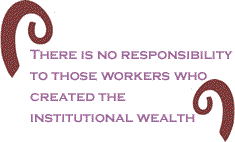
|
|||||||||||||||||||||||

|
|

Custom Search
|
|
 |
|
While millions of Americans are waiting for their first unemployment check or the knock on the door by a sheriff’s deputy bearing an eviction notice, there are people in other parts of the world for whom the economic collapse has them wondering how long they and their children can survive. This deep recession, tending toward depression, is hurting Americans, but for hundreds of millions who have come to depend on “free trade” with the so-called developed world, it’s a matter of life or death. Factories
are closing in But
when our economy started to go downhill on skids, they began hurting,
as well. Untold numbers of those factories have been closing, because
the orders from the
The smaller Asian countries that have come to depend on “free trade” with developed nations also are feeling the pinch. Factors that have forced developing countries into difficulty include: debt, privatization of publicly-owned resources or government functions, and mass urbanization, which involves moving people off the land to urban areas. The
latter was the policy urged on developing nations, which were convinced
to clear the land to grow cash crops for export to pay back loans
to the World Bank and the International Monetary Fund (IMF). This
was done over many years by those two institutions and other “aid
and assistance” agencies of the small elite of powerful nations,
such as the There
is small likelihood that peasants who have worked in the global
factories of the provincial cities of At
least, when they were back there in the mountains and valleys, they
had the prospect of something to eat. They could grow it themselves.
As urban dwellers or slum dwellers today, the potential for that
is small. In Within
the past year, the average hourly wage in Now that the world is in an economic slide, the world’s affluent have to ask themselves whether they have a responsibility to the world’s poorest, those who have been used to make the cheap-goods-high-profit world economy. If the experience of American workers is any indication, the world’s poor will wait a long time before transnational corporations make any effort to see that their wealth-producers have such basic human rights as food, clothing, shelter, health care, education, and clean water.
In
the Christian Science Monitor this week was a picture of
bags of pinto beans being unloaded in It
makes people feel good to provide that kind of assistance, but the
policies of the Historically, shipments of food aid to countries around the world have been notorious for never making it out of the port city; rampant corruption in the distribution; routine theft and illegal sale of the food, and the near impossibility of getting the food to those who need it most because the road and highway systems are poor or non-existent. Better
to send aid to support growth of indigenous and peasant agricultural
systems and the development of water systems. In such aid programs,
the people would become self-sufficient and self-reliant. For our low-wage trading partners, there doesn’t seem to be much in it, except low wages for people who traditionally have not worked for wages. The mantra of media cheerleaders of global “free trade” has been that it’s enough that there are jobs that pay anything - even 10 cents an hour - because, before that, there were no wages. Global
corporations should have learned much over the years from their
dealings with developing countries, but the way that food aid is
being handled in
BlackCommentator.com Columnist, John Funiciello, is a labor organizer and former union organizer.
His union work started when he became a local president of The Newspaper
Guild in the early 1970s. He was a reporter for 14 years for newspapers
in |
|
Any BlackCommentator.com article may be re-printed so long as it is re-printed in its entirety and full credit given to the author and www.BlackCommentator.com. If the re-print is on the Internet we additionally request a link back to the original piece on our Website. Your comments are always welcome. eMail re-print notice
If you send us an eMail message we may publish all or part of it, unless you tell us it is not for publication. You may also request that we withhold your name. Thank you very much for your readership. |
|
| |
|
| March
26 , 2009 Issue 317 |
|
| Executive Editor: Bill Fletcher, Jr. |
| Managing Editor: Nancy Littlefield |
| Publisher: Peter Gamble |
| Est. April 5, 2002 |
Printer Friendly Version
in resizeable plain
text format or pdf
format. |
| Frequently Asked Questions |
 |

|
 |
 |
 |
| |
| |





























 India,
a significant trading partner with the U.S., also has its problems,
as it shifts from a largely agricultural society, to one that could
become dependent on the kind of “industry” that is preeminent in
the U.S. - use and storage of information.
India,
a significant trading partner with the U.S., also has its problems,
as it shifts from a largely agricultural society, to one that could
become dependent on the kind of “industry” that is preeminent in
the U.S. - use and storage of information. The
thought of economic collapse never crossed their minds, but the
potential negative effects are enormous.
The
thought of economic collapse never crossed their minds, but the
potential negative effects are enormous.
 There
is no global unemployment insurance program, and the aid programs
of
There
is no global unemployment insurance program, and the aid programs
of  But
there is little profit in this for the global trading system and,
therefore, it is not of great interest to transnational corporations.
But
there is little profit in this for the global trading system and,
therefore, it is not of great interest to transnational corporations. Low-wage
workers of the global economy are now in need and it’s likely that
no thought will be given to them, even though they have made the
gargantuan profits possible. In the ideology of a global capitalist
system, there is no responsibility to those workers who created
the institutional wealth. Corporations don’t care. The character
of their structure does not allow them to care. People, though,
can - and must - care and make a difference by taking action.
Low-wage
workers of the global economy are now in need and it’s likely that
no thought will be given to them, even though they have made the
gargantuan profits possible. In the ideology of a global capitalist
system, there is no responsibility to those workers who created
the institutional wealth. Corporations don’t care. The character
of their structure does not allow them to care. People, though,
can - and must - care and make a difference by taking action.





